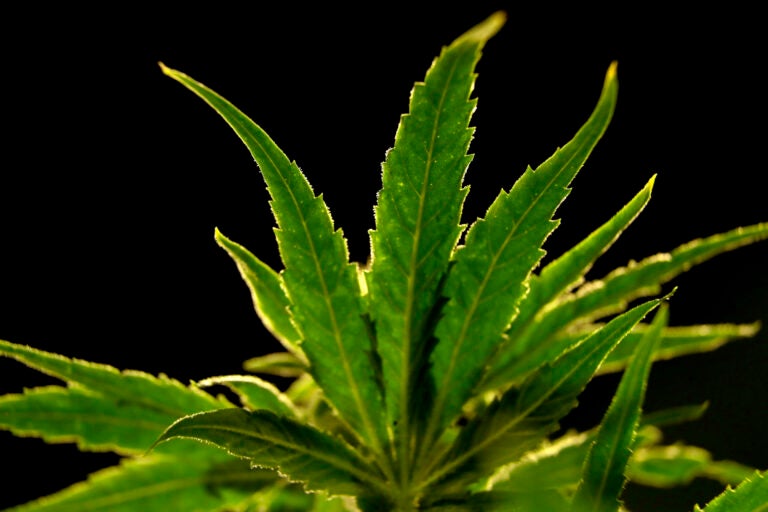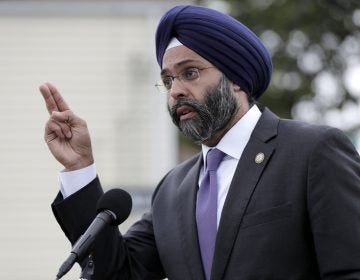Murphy, Dems still hammering out issues for decriminalizing weed
A target Jan. 1 deadline will go unmet as N.J. Gov. Phil Murphy, and lawmakers sort out penalties for minors busted for marijuana.

File photo: A marijuana plant grows at the Compassionate Care Foundation's grow house in Egg Harbor Township, N.J. (Julio Cortez/AP)
This article originally appeared on NJ Spotlight.
—
New Jersey’s path to legalizing recreational use of marijuana has been tortured and often confusing, so maybe it’s fitting that even after voters overwhelmingly approved the move on Jan. 1, it’s going to take a bit longer to make it happen.
In the meantime, let the public beware: Possessing marijuana will not be legal come Friday. In fact, it will still be a crime until elected officials can once again hammer out some last-minute issues.
Gov. Phil Murphy, it turns out, is refusing to sign two landmark bills passed on Dec. 17 — one to legalize adult-use marijuana, the other to decriminalize up to 6 ounces of possession. The governor’s office says they need to correct a “drafting error” before the measures can become law.
This is just the latest in a series of setbacks for pot legalization since voters overwhelmingly passed the Jan. 1 ballot initiative. The delays have been caused by a number of disagreements among Democrats, who control the State House and the governor’s office. The bills were pulled twice after last-minute policy disputes.
Murphy has now apparently made it clear that he won’t sign the current bills until the changes are made, which won’t happen until next year, sources say.
Decriminalization delays
At issue now is the decriminalization bill, which does not specify penalties for minors who possess marijuana. Both legislative and gubernatorial sources said language is being worked out — most likely destined for a “clean-up bill” — to specify penalties for minors, as well as some other changes.
“There was no drafting error. That language was intentionally intended to protect minors,” said one lawmaker familiar with the back-and-forth. “And why is the governor waiting until now to bring this up?”
Amol Sinha, executive director of the American Civil Liberties Union of New Jersey, was one of many who agreed with the language of the bill as it was passed. “Children should not be severely punished for something that is decriminalized or legal for adults. I understand the urge to create disincentives to prevent youth use of cannabis, but criminalization is not the answer … The goal, ultimately, is to make sure we’re reducing the number of kids in the criminal legal system and limiting the number of police interactions, which can escalate and lead to tragic outcomes, particularly for Black and brown children.”
Carl Golden, a longtime political player and now a senior contributing analyst for the William J. Hughes Center for Public Policy at Stockton University (and NJ Spotlight News columnist), sees this dustup as another troubling example of a dysfunctional relationship between the governor and fellow Democrats in the Legislature.
“Wait a minute. This is a legitimate policy disagreement that’s being hashed out after the bill was passed. Now you’re saying, ‘Oops, we forgot?’” Golden said. “This speaks to the continuing disconnect between the two branches. The bill has been poorly handled for years.”
“We’ll be able to rectify this,” said Sen. Nicholas Scutari (D-Union), sponsor of the legalization bill, who declined to elaborate.
Jan. 1 deadline pushed back
So what happens to the Jan. 1 effective date voters endorsed? The short answer is: It gets pushed back.
“The intent of the amendment is clearly to have a highly regulated and taxed cannabis industry, not a simple legalization,” said Robert Williams, a state constitutional law expert at Rutgers Law School. “It appears to me that the amendment … doesn’t legalize cannabis until the legislation is passed, takes effect, and the regulations are adopted and take effect.”
And what will cops do in the meantime?
“For right now, I think we’re going to see a policy-based gap-filler. The AG has reminded law enforcement and prosecutors that the amendment may cause confusion and has stayed certain criminal prosecutions until we have more clearly defined rights,” said attorney Jennifer Roselle, a member of the Cannabis Law Industry Group at Genova Burns. Last month, Attorney General Gurbir Grewal ordered prosecutors to freeze all low-level marijuana cases statewide until at least Jan. 25.
“Once final action is taken on the legalization and decriminalization bills, the attorney general will issue additional guidance, which will, among other things, address enforcement issues related to the unregulated marijuana market,” said AG spokesman Peter Aseltine. “Meanwhile, the attorney general has emphasized to law enforcement that they have broad discretion in handling low-level marijuana offenses.”
Meanwhile, lawmakers and administration officials continue to shape a marijuana bill behind the scenes.
“One model to consider is that of tobacco, where those who sell to children are penalized but the underage possession of tobacco is not itself criminal,” said the ACLU’s Sinha. Encouraging law enforcement interactions and arrests of kids will only perpetuate the harms of prohibition — the racially disparate arrests that are the unfortunate hallmark of New Jersey’s war on drugs.

Get daily updates from WHYY News!
WHYY is your source for fact-based, in-depth journalism and information. As a nonprofit organization, we rely on financial support from readers like you. Please give today.





